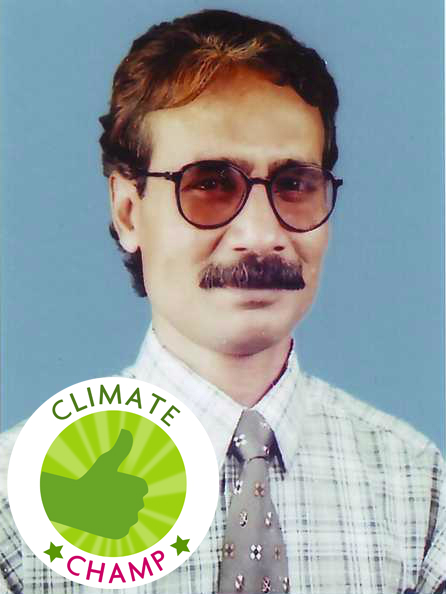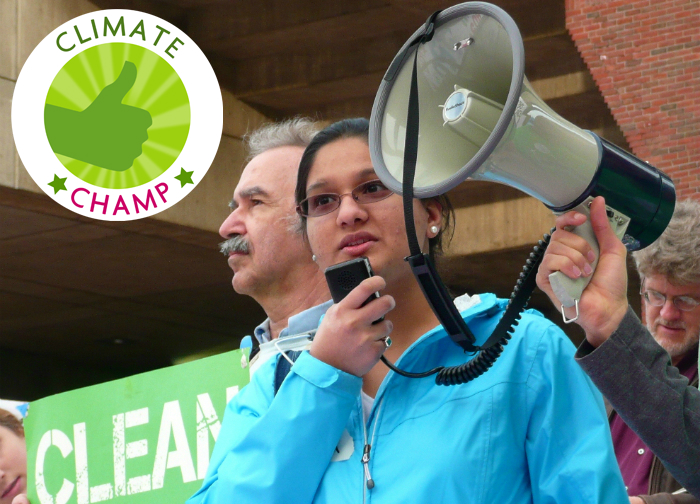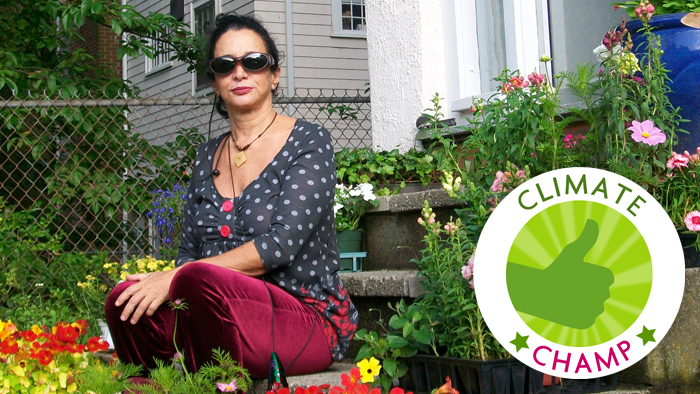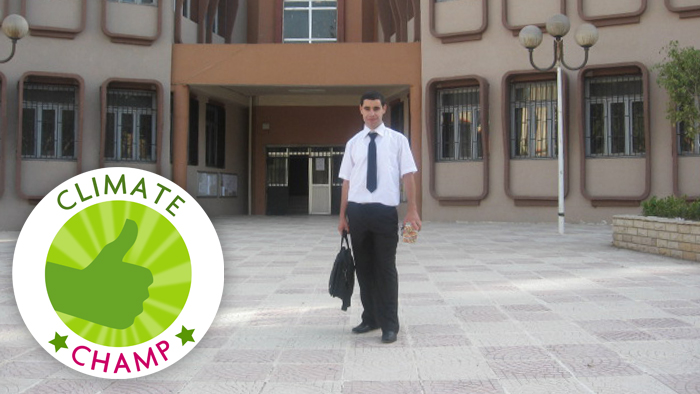Search Results for Tag: global ideas
Earth Day 2013 – the day google releases the tiny bears
Today is Earth Day, a day to raise the awarness for climate protection and to make clear we don’t have a backup-earth waiting in the cellar if we have wasted this one. The Earth Day movement is has quite a long tradition, this year it’s 43 years old, a milestone Google dedicates one of it’s occasional doodles.
Also these dedications have a long tradition, starting with two aliens looking at our planet in 2003 over melting polar ice in 2007 up to animated flowers in 2012.
This year’s the design is more elaborate. You will see a scene of hills with snow-capped mountains and a lake teeming with fish, bears peeping out caves, rain falling from clouds if you click them. It’s playfull, cute and may work as a mind-opening tool to make sure everyone knows what gem we live on.
Google has started a few efforts lately to support a greener environment. It’s funded renewable energy projects and published its carbon footprint for the first time.
Earth Day was born in the US in 1970. It’s idea is to activate “individuals and organizations to strengthen the collective fight against man’s exploitive relationship with the planet.”
Earth Day was born in the US in 1969, presented as a concept at the UNESCO conference in San Francisco. It’s idea was and still is to activate “individuals and organizations to strengthen the collective fight against man’s exploitive relationship with the planet.”
At the same time Gaylord Nelson U.S. Senator from Wisconsin back then thought about a national day of the environment after witnessing the ravages of the 1969 massive oil spill in Santa Barbara, California. The idea became popular, so since 1970 “Earth Day“ became a regular and steady growing event. During the 1990s the day crossed borders and became what it is today, a worldwide supported day in honor of the earth.
Climate champ – ‘we must stop being a slave to consumption’
 Do you feel responsible for our future? Are you tired of waiting for a breakthrough at climate conferences? If you are already taking action yourself, you are our ClimateChamp and we want to get to know you! Answer our questionnaire to become a part of our new blog series, take your chance to be nominated as a Climate Champ.
Do you feel responsible for our future? Are you tired of waiting for a breakthrough at climate conferences? If you are already taking action yourself, you are our ClimateChamp and we want to get to know you! Answer our questionnaire to become a part of our new blog series, take your chance to be nominated as a Climate Champ.
What is your name? How old are you? And where do you live?
My name is SM Farid Uddin Akhter Farid. I was born on January 1, 1964 in Bangladesh.
How does climate change affect your everyday life / your community?
Nature’s behaviour has been regularly irregular and erratic. The basic securities of food, water, energy, livelihood and human life are highly threatened. And my country, Bangladesh, has been identified as the most vulnerable by scientists and policy makers across the world.
What trigger event led you to start fighting climate change?
No special event. Just the considered opinion that if we want peace for all, if we want to ensure rights for all, everybody has to save a bit, reserve, preserve, rejuvenate and conserve resources. Therefore we need a significant change in mindset, behaviour and attitude if we want to combat climate crisis, reduce risk and poverty and save biodiversity.
How exactly do you fight climate change?
I’m part of the Sasrai movement. The movement is aimed at spurring each individual, family, community, institution and organization to combat climate change and global warming and think about issues such as food, fuel, water security, poverty, disaster, waste, ecosystems and biodiversity etc.. Even small changes in our daily behaviour can help prevent greenhouse gas emissions without affecting our quality of life. In fact, they can also help save money. The Sasrai-movement policy commits to save resources and to reduce solid waste in our daily living – no matter how small it is.
What do you say to climate change deniers?
The world is heading for irreversible and potential catastrophic climate change. Just think about the repeated natural disasters in Australia, Africa, New Zealand, Brazil, Pakistan, Japan, Iran, Myanmar, Thailand, USA, Russia and Indonesia. Remember what superstorm Sandy did to the Caribbean and North America? Nature rebelled! It didn’t discriminate between a rich super power or a poor nation. So each one of us must ask ourselves “how could I be consuming less?” We must stop being a slave to consumption.
Worst case scenario: What do you think your city will look like 10 years from now, if no action is taken to fight climate change?
There will be excessive heat and cold in the cities, lack of safe water and water logging due to sudden excessive downpours, especially in the region I live. But the Sasrai movement’s main consideration is tomorrow, the future generation who are not responsible for destroying the earth’s resources. We believe in the potential of communities to solve their own problems and adapt to climate changes with the help of resources they own right now.
Best case scenario: What do you think your city will look like 10 years from now if more and more action is taken to fight climate change?
Hopefully, there will be no more lack of soft water, no more land slides, less suffering among low income people and no more flooding in parts of my city.
Short and simple: What do you demand from your government as far as climate change is concerned?
To raise mass awareness, to wish peace for all and to ensure rights for all. Everybody must save a bit, reserve, preserve, rejuvenate and conserve resources. It would be great if they had a hand-written Sasrai movement poster in every government building.
How can interested people get involved in your project?
Since 2004, we have been trying to bring about a significant change in mindsets, behaviour and attitudes among all regarding use and abuse of resources. We promote austerity aimed at curbing hunger, poverty, water scarcity and environmental degradation. We are in the process of strengthening programs in educational institutions aimed at bringing significant behavioural and attitudinal change among children.
Climate Champ – This isn’t a game. Our future is at stake.

Do you feel responsible for our future? Are you tired of waiting for a breakthrough at climate conferences? If you are already taking action yourself, you are our ClimateChamp and we want to get to know you! Answer our questionnaire to become a part of our new blog series, take your chance to be nominated as a Climate Champ.
1.What is your name, how old are you and where do you live?
My name is Srijesa Khasnabish and I’m eighteen years old. I’ve lived in Lexington, Massachusetts (USA) for most of my life.
2.How does the climate change affect your everyday life / your community?
I am shocked by how climate change impacts so many different aspects of my everyday life. For example, how I get to school in the morning: if I wake up early, I take the bus and save some carbon dioxide emissions. If I wake up late, miss the bus, and have to drive to school, I’m further contributing to global warming. I always shake my head in disgrace when I see my peers driving to the town center in the middle of the day whereas it only take seven minutes to walk there. This is one thing that motivates me to action.
What is most detrimental to my community is the severe storms we’ve been experiencing. During Hurricane Sandy, damages were extensive. An old pine tree even fell on my house and crashed into my living room! Many people’s basements were also flooded and most of our community was without power for up to 3 days.
3.What trigger event led you to start fighting climate change?
What sparked my interest in the climate change movement was an assembly I watched four years ago, presented by the Alliance for Climate Education (ACE) and created to educate youth about climate change and inspire solutions. The forty-five minutes I spent watching this assembly changed my perspective radically and converted me into a fervent climate activist. Today I am the New England Youth Representative for ACE, where I help to galvanize the Youth Climate Movement in my local community.
4.How exactly do you fight climate change?
I fight climate change on several levels. First of all, in my house: my family recycles, we’re conscious of the energy we use, we hang our clothes out to dry, and eat vegetarian several times a week. At school, I’m the president of the Global Warming Action Coalition. This year, we’re working to maintain a student run vegetable garden and establishing a school-wide composting system. We’ve purchased bike racks and are working on getting hand dryers in our school’s bathrooms to reduce waste. Outside of school, I’m the New England Youth Representative for ACE. As a Youth Rep, I help facilitate at monthly Youth Leadership Trainings, give speeches and raise awareness about youth climate action in Massachusetts, and blog about climate change and my experiences. Last year I was a keynote speaker at a Youth Climate Summit at MIT, and I participated in a Climate Vigil to encourage the Massachusetts Senate candidates to address climate change in their debates. I consider the work I do with ACE extremely important because I’m helping to educate and motivate youth to take action against climate change. I’m spreading a cause I earnestly care about and I find it exceptionally rewarding.
5.What is your opinion about climate change skeptics?
I strongly believe all skeptics must wake up to the climate change crisis because it’s a universal issue – it doesn’t matter where you live, or how rich or poor you are, you’re impacted by climate change. And if I could realize that when I was just fifteen years old, children and adults worldwide should be able to acknowledge it too. More importantly, the amount of time we have to address climate change is limited. The sooner the world acknowledges this issue, the sooner we can cooperate to build a brighter future, one where policies are enacted to protect the planet and there’s a change in the human way of life. This means people are conscious of their emissions: they think about where their food comes from and how their houses are being heated, and how all of this affects the environment. People think twice before buying a plastic water bottle or throwing a half-eaten apple in the garbage, where it will be buried under pounds of trash and release methane as it decomposes.
6.Worst case scenario: What do you think your city looks like 10 years from now, if no action had been taken to fight climate change?
I envision more frequent, monstrous storms that damage homes, power lines, trees and people’s lives. The destruction caused by these storms will reduce the quality of life in Lexington and be detrimental to the economy as well (especially because Lexington makes a large income on tourism). The intense summer heat will cause many people to perish, and emissions from cars will cause smog in the air, leading to more children suffering from asthma.
7.Best case scenario: What do you think your city looks like 10 years from now, if more and more action had been taken to fight climate change?
Ten years from now I hope to see a variety of infrastructure improvements throughout Lexington. I imagine plastic bags and bottles will be rare and backyard vegetable gardens will flourish behind every house. I also envision smaller houses and cars, perhaps even zero cars per household because buses and subways will be the preferred mode of transportation. The bike paths throughout town will be reworked such that they are easily accessible by everyone and the optimal way for children to get to school when the weather permits. The town will save a tremendous amount of money on energy, as solar panels will be mandatory and the rest of the needed energy will be wind energy, produced in one section of town. Education about climate change will begin in elementary schools, where children will also develop the habit of recycling and composting – sustainability will be second nature to them by the time they are in high school.
Perhaps my vision of the future is a bit unrealistic or is more accurate as a description of what my city will look like in 20 years, but the core of what I want to see in the future is more education on the causes and impacts of climate change. I feel that if more people understand how human choices and actions are triggering problems like sea level rise and severe weather conditions, they will be more likely to ameliorate their lifestyle in an earth-conscious way.
8.Short and simple: What do you demand from your government as far as climate change is concerned?
I demand that the US government 1) reject the Keystone XL pipeline and 2) take climate change seriously by passing laws that are in line with the science and protect our planet and its inhabitants. This isn’t a game. Our future is at stake.
Climate Champ – Provide Environmental Education
 Do you feel responsible for our future? Are you tired of waiting for a breakthrough at climate conferences? If you are already taking action yourself, you are our ClimateChamp and we want to get to know you! Answer our questionnaire to become a part of our new blog series, take your chance to be nominated as a Climate Champ.
Do you feel responsible for our future? Are you tired of waiting for a breakthrough at climate conferences? If you are already taking action yourself, you are our ClimateChamp and we want to get to know you! Answer our questionnaire to become a part of our new blog series, take your chance to be nominated as a Climate Champ.
1. What is your name? How old are you? Where do you live? What is your job?
My name is Kátia Martins de Almeida. I am 61 years old and I live in Rio de Janeiro, Brazil. I am a clinical Psychologist and I used to live in Boston, MA. Here I was working with streets kids and as a Psychologist in public schools. In 2003 when I came back to Brazil to take care of my mother, I bought land in Cruzeiro. Now I am retired and I live in a two-room-apartment in front of the Sugar Loaf.
2. How does the climate change affect your everyday life in your community?
The community life in the village Cruzeiro had totally changed in the last 5 years. More clearly, on the 12th of January 2011 a huge amount of water came from the sky, with lightening I have never seen before. The massive rain broke 50 tons of rocks of from our granite mountains which rolled over the houses of the village. The river raised 3 meters in 3 minutes. In these 3 minutes we lost the only bridge that we had and 20 houses were destroyed. Furthermore, and even more tragic, 2 people died. Cruzeiro is a small agricultural village with 500 families. Most of the people around here are framers. The community is in total grief because of all their losses and sorrows about their identity: the land was completely mud and they had to move to somewhere else. After that thunderstorm the government did not help us. It is rumored that corrupted politicians had stolen money which the Federal Government gave to the City Hall of Teresópolis (another affected village where more than 1000 people died). Fact is the government did not build a new bridge in our village Cruzeiro, neither they helped us to rebuild the destroyed houses.
3. What trigger event led you to start fighting climate change?
2003 when I bought my land, the Neighborhood Association of Cruzeiro found a water source inside it. With 70 volunteers, they built a pipe leading to the village, where the Association has a water wheel and shares the water for a fee of 6 Real (about 2 Euro). Among others, the collected money is for the bakery, the butcher, the shoemaker and for the 20 family-houses, which disappeared under the water on January 12th 2011.
4. How exactly do you fight climate change?
I founded a non-profit organization in order to make it easier to help my community. In 2009 I was trying to start a project to transform my 400.00 m2 land of natural jungle (in Cruzeiro, Brazil) into a World Natural Reservation.
5. What do you say to climate change deniers?
Denial is a mental disease and must be treated like that. Or they are cynical. I would like to invite them to come to some beaches here in Brazil that are disappearing and also to come to visit the families of the Rio de Janeiro’s agricultural belt. We are the salad garden of Rio de Janeiro! If we loose our plantations, Rio will have trouble eating green leaves and fruits.
6. Worst case scenario: What do you think your city looks like 10 years from now, if no action had been taken to fight climate change?
It will disappear because without hope for good future the youth is leaving. There is some kind of “Youth Exodus” in all agricultural villages.
7. Best case scenario: What do you think your city looks like 10 years from now, if more and more action had been taken to fight climate change?
If we provide environmental education to the people who live around the river Rio Paquequer, we can avoid a lot of problems about trash and diseases.
8. Short and simple: What do you demand from your government as far as climate change is concerned?
Stop killing Amazon, first of all! The government must introduce environmental education in the curriculum of all Brazilian schools. The government has to give us sewers or pipes for ourselves to build our sewers and also they have to give us trash bags to pick up heavy trash. Another point is to talk with the farmers to avoid some bad ecological habits.
9. How can interested people take part in your project?
Asking them to come to visit Rio de Janeiro and its rural farms and see the reality that the Media does not show about Rio.
Climate Champ – Act now or never!
 Do you feel responsible for our future? Are you tired of waiting for a breakthrough at climate conferences? If you are already taking action yourself, you are our ClimateChamp and we want to get to know you! Answer our questionnaire to become a part of our new blog series, take your chance to be nominated as a Climate Champ.
Do you feel responsible for our future? Are you tired of waiting for a breakthrough at climate conferences? If you are already taking action yourself, you are our ClimateChamp and we want to get to know you! Answer our questionnaire to become a part of our new blog series, take your chance to be nominated as a Climate Champ.
What is your name? How old are you? And where do you live?
My name is Kaddouche Mourad, born on the 23rd of October 1986 in Algeria. Right now I live in Tizi Ouzou (Kabylia) and I study at the University of Béjaïa.
How does climate change affect your everyday life / your community?
Droughts are harmful for agriculture and that threatens our food security. A lot of water is needed to irrigate fields, and that takes away from the supply of drinking water!
What trigger event led you to start fighting climate change?
The trigger event was snow that measured four feet (1.2192 meters) high here in Algeria. That happened twice in Algeria, in 2005 and 2012. Both times it lasted more than 15 days. There were many problems for people especially in getting food and health care because neither the local authorities nor the government were able to solve the problems. On the other hand in the summer, temperatures rise to more than 45 degrees Celsius (113 degrees Fahrenheit) – that sometimes leads to forest fires.
How exactly do you fight climate change?
As a doctoral candidate in biology – to be precise in biology, health and environment – I hope that my thesis will help to solve some questions. My thesis is about olive tree fields as an agro-ecosystem. The topic corresponds to sustainable development because the olive tree ecosystem includes social, economic and ecological values in Kabylia. The olive tree agro-ecosystem helps people to earn more money without using fertilizers, pesticides or herbicides. Some of these ecosystems are still wild and here biodiversity is preserved. I study the different disruptions that occur by monitoring it with GIS (geographic information systems) and by mapping . With the results, I try to get a better understanding of the reality to take practical decisions to help both local inhabitants and decisionmakers improve food safety and the environment. The topic is still in development so of course many points still need to be discussed.
What do you say to climate change skeptics?
Harmful effects are on the way if we don’t act now!
Worst case scenario: What do you think your city will look like 10 years from now if no action is taken to fight climate change?
We will see more smog and fewer green spaces.
Best case scenario: What do you think your city will look like 10 years from now if further action is taken to fight climate change?
There will be fresh air, clear water and still green areas.
Short and simple: What do you demand from your government as far as climate change is concerned?
Act now or never!








Feedback